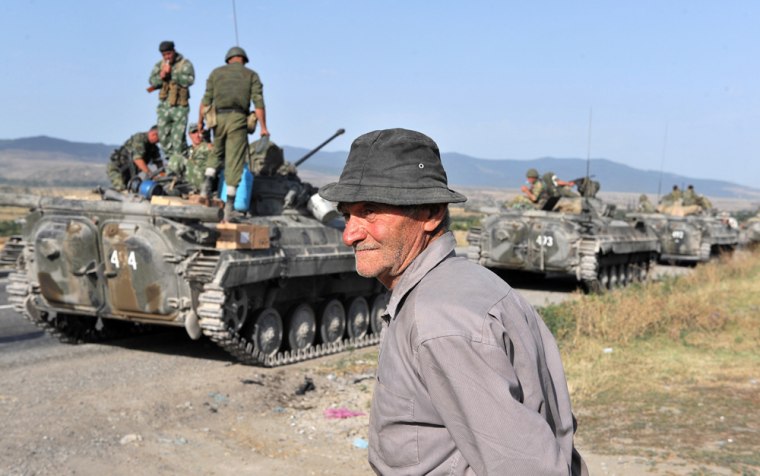The struggle over a tiny, impoverished part of the Caucasus mountains has erupted into a widening confrontation between Russia and the West, the worst since the Soviet Union collapsed.
The rift between Russia and the former Soviet state of Georgia over South Ossetia, a hilly land the size of Rhode Island, threatens a web of institutions spun since the end of the Cold War to tie Moscow to the U.S. and Europe. One by one, the strands holding the web together are fraying.
Even if the cease-fire holds in Georgia, the consequences of the crisis could be grim: Tensions might jeopardize Russian energy shipments to Europe, cut the U.S. off from access to the International Space Station, end intelligence cooperation between Washington and Moscow in the war on terrorism.
Western leaders are mulling expelling Moscow from the Group of Eight club of wealthy nations and denying it membership in the World Trade Organization.
Beyond denying Russia the privilege of participating in an alphabet soup of international groups, the escalating rhetoric threatens to resurrect the ugliest aspect of the Cold War: the doomsday brinksmanship between Russia and the West.
Gen. Anatoly Nogovitsyn, a top Russian officer, said Friday that Poland's agreement to accept a battery of U.S. missile interceptors has put Poland at risk of attack, perhaps with nuclear weapons, the Interfax news agency reported.
The Russian foreign minister, meanwhile, warned that the Kremlin might halt cooperation on efforts to rein in Iran's nuclear program.
The Georgia conflict also could jeopardize several arms control agreements, including the Nunn-Lugar Comprehensive Threat Reduction act, which has provided hundreds of millions of dollars in aid to Russia for destroying, dismantling and securing its nuclear weapons.
Some U.S. lawmakers see risks to U.S.-Russia cooperation on the International Space Station, which could spell disaster for the program. After the U.S. space shuttle fleet is retired in 2010, Russia's Soyuz rockets will become the only way to get to the station for several years.
Others members of Congress are proposing a resolution urging that Russia be stripped of its role as host of the 2014 Winter Olympics.
Trouble brewing for years
During much of the 1990s, a poor, divided and chaotically led Russia depended on loans and handouts from the West. As it regained strength, particularly on the back of rising oil prices, Moscow felt its role as an international player was being insulted or ignored.
The West was slow to condemn the erosion of Russia's embryonic democratic institutions, as President Vladimir Putin, now the prime minister, methodically restored the Kremlin's historic role in Russia as the center of power.
The Sept. 11 attack on New York and Washington united the West and Russia in what both regarded as a struggle against global terrorism. But the partnership soon soured for several reasons — including overtures to join Western blocs by Georgia and another former Soviet state, Ukraine.
Moscow came to regard Georgia's "Rose Revolution" and Ukraine's "Orange Revolution," which replaced Kremlin-leaning governments with pro-Western leaders, as part of an effort engineered by the United States and its allies to install friendly governments on Russia's borders.
A number of disputes have followed, notably over the anti-missile system that the U.S. wants to install in former Soviet satellites in Eastern Europe.
But the harshest blows, from Russia's perspective, may have come this year.
Start of the 'new Cold War'?
Many Western nations recognized Kosovo when it declared independence in February from Russia's ally, Serbia. Then in April, NATO promised eventual membership to Georgia and Ukraine, drawing a vow from Russia to do everything it could to stop the military alliance from expanding to its southern borders.
But until Russia invaded Georgia — after the Georgians launched an offensive against the Russian-allied separatist government in South Ossetia — what some have called the "new Cold War" had largely been just harsh rhetoric and symbolic gestures.
There was hope among some Western policy analysts that Russia's assertive new policies were all talk, perhaps a gambit by Putin to rally Russians behind the election of his hand-picked successor, Dmitry Medvedev. But having talked tough for so long, the Kremlin could not afford to act meekly when South Ossetia was attacked.
Still, the world is not the same as during the Soviet era. Russian companies and tycoons now have ties around the globe — a steel mill in Baltimore, nickel mines in Canada and Botswana, mansions in London. Russia's trade and investment abroad could act as a brake on its actions.
Padma Desai, director of the Center for Transition Economies at Columbia University, feels the sides will find a way to live together. "We will always have to bargain with them because they will always be a major geopolitical power," she said.
